 Leading Blog | Posts by Month |
 Leading Blog | Posts by Month |
11.30.20

LeadershipNow 140: November 2020 Compilation
See more on
Posted by Michael McKinney at 01:57 PM
11.27.20

The Hidden Habits of Genius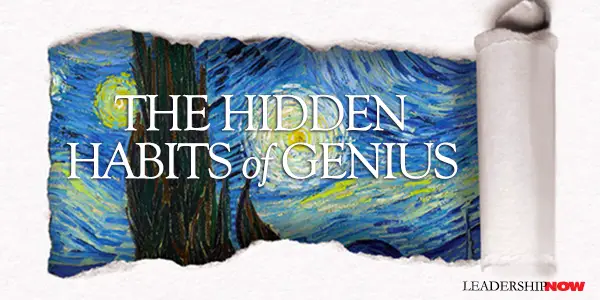
WHO and what is a genius? The label gets thrown around a lot. Are you a genius? Probably not. But then, most of us are not. However, you can learn to think like one. Craig Wright teaches a class at Yale on the nature of genius. He distills all of that work into his book with a hopeful title, The Hidden Habits of Genius: Beyond Talent, IQ, and Grit—Unlocking the Secrets of Greatness. Perhaps there is something we can learn from true geniuses that will help us perform better ourselves. I like the definition of a genius provided by German philosopher Arthur Schopenhauer: “A person of talent hits a target that no one else can hit; a person of genius hits a target that no one else can see.” Wright defines a genius as “a person of extraordinary mental powers whose original works or insights change society in some significant way for good or for ill across cultures and across time.” Geniuses work hard, but it’s not the hard work—the 10,000 hours of practice—that is the secret. “Practice may make the old perfect, but it does not produce innovation.” Talent may be the impetus, but hard work moves it along. To get to the top, it seems “you must max out both.” IQ tests can’t predict the next genius or a person’s potential. Some who have done well academically, like Marie Curie, Sigmund Freud, and Sergey Brin, went on to do remarkable things. But others we look up to today, like Einstein, Edison, Steve Jobs, and Picasso, did poorly in school. What about prodigies—young people who possess talents far beyond their years? Not really. “The difference is that geniuses create. They change the world through original thinking that alters the actions and values of society. Prodigies merely mimic. Childlike creativity plays a part. Picasso said, “Every child is an artist. The problem is to remain an artist as we grow up…. When I was a child, I could paint like Rafael, but it took me a lifetime to paint like a child.” “From Einstein’s mental play with images emerged his famous thought experiments. Einstein was able to imagine the world as a child while keeping apposite scientific information in mind.” Geniuses are lifelong learning addicts. “Students may receive information and learn methodologies in school, but the game changers of this world acquire the vast majority of what they know over time and on their own.” They learn what they need to know. What about passion? “If our passions drive us in ways that ultimately change society, that change is a mark of genius.” Not all passion leads to genius. Geniuses see things differently. They “cannot accept the world as described to them. Each sees a world asunder and cannot rest until things are put right.” Some geniuses are rebels, but not all rebels are geniuses—no matter how remarkable they may seem in the present. Some rebels, misfits, and troublemakers are just that. Not geniuses, but rebels, misfits, and troublemakers—people that just want their own way or push their own agenda. Wright correctly asks, “What is it that all of us believe today that some genius will disprove tomorrow?” We should be more careful pushing our biases and opinions. “Most rebels are not geniuses.” A person that changes the course of history need not be a genius, but rather someone who saw an opportunity and took it. Some people we presently regard as geniuses are clever and creative, but they are not geniuses. Aesop observed in his fable, The Fox and the Hedgehog, that “the fox knows many small things, while the hedgehog knows one big thing.” Wright says, be the fox. Develop a wide range of knowledge, perspectives, and skills. Cross-train. “The more broadly based the information in mind, the more likely that disparate ideas are combined.” Jeff Bezos observed, “The outsized discoveries—the ‘non-linear’ ones—are highly likely to require wandering.” “The lesson for all of us,” says Wright, “stay nimble.” Imagine the end and work backwards. Think opposite. Again, Bezos instructs: “You see a new technology, or there’s something out there, … and you work backwards from a solution to find the appropriate problem.” Wright says, “the more a person can exploit the contradictions of life, the greater his or her potential for genius.” To coax out your best ideas, relax. “If you need a fresh idea, go for a walk, or jog, or simply get into a relaxing conveyance so as to allow your mind to range more freely.” Then concentrate. Like a genius, “create a daily routine for yourself that comes with a four-wall safe zone for constructive concentration…. At the end of the day, you alone are responsible for synthesizing that information and producing something.” Could we use more geniuses? Well, yes. But what we really need are people who learn to think like a genius. Not the pandering and the misuse of statistics to push an agenda that has become so prevalent. We need people who will take a measured approach and contribute constructive ideas that will benefit the rest of us. 
Posted by Michael McKinney at 02:31 PM
11.26.20

Leading Thoughts for November 26, 2020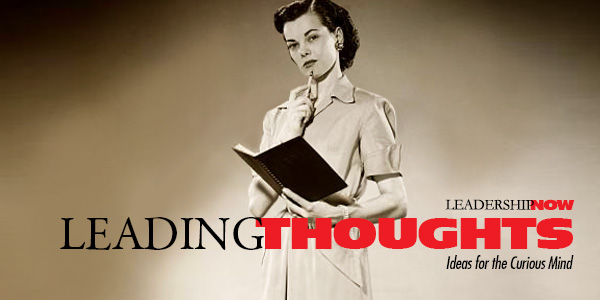
IDEAS shared have the power to expand perspectives, change thinking, and move lives. Here are two ideas for the curious mind to engage with: Dietrich Bonhoeffer writing to his parents from prison on gratefulness: “In ordinary life we hardly realize that we receive a great deal more than we give, and that it is only with gratitude that life becomes rich. It’s very easy to overestimate the importance of our own achievements in comparison with what we owe to others.” Source: Letters and Papers from Prison (1943) Diana Butler Bass on finding gratitude: “Practicing gratitude calls us to better lives, and a better world. And begin before you are ready. Even when a million reasons to not feel grateful stand in your way. That is when gratitude is at its best. Source: Grateful: The Subversive Practice of Giving Thanks Look for these ideas every Thursday on the Leading Blog. Find more ideas on the LeadingThoughts index.
Posted by Michael McKinney at 07:16 AM
11.25.20

How You Become Optimistic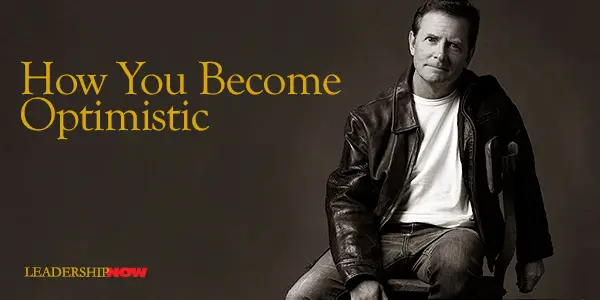
MICHAEL J. FOX has lived with Parkinson’s disease since 1991. He says he has developed a sort of détente with the disease that requires adaptability and resilience—and a lot of his characteristic optimism. But recently, on top of that, he had a spinal cord injury that required surgery and months of rehabilitation, going from wheelchair to walker to cane to finally walking. And then he fell. In his book No Time Like the Future: An Optimist Considers Mortality, he writes that the fall brought him “down in more ways than one. It isn’t that I am hurt; I’ve been hurt many times. I’ve been through a lot, suffered the slings and arrows. But for some reason, this just feels personal.” He says, “Make lemons into lemonade? Screw it—I’m out of the lemonade business.” The accident created doubt. How could he put a positive spin on this? How could he encourage others if he didn’t have what it took? He told Kate Coyne at People magazine:
But through it all, he reclaimed his optimism and found the foundation of optimism. “Optimism is really rooted in gratitude. Optimism is sustainable when you keep coming back to gratitude, and what follows from that is acceptance. Accepting that this thing has happened, and you accept it for what it is. It doesn’t mean that you can’t endeavor to change. It doesn’t mean you have to accept it as a punishment or a penance, but just put it in its proper place. Then see how much the rest of your life you have to thrive in, and then you can move on.” No matter what our situation is, gratitude brings joy into our life. Life will always present us with difficulties, but gratefulness helps us push through. Gratitude is what turns a bad year into a good one—a challenge into an opportunity. See how others have found something to be grateful for this year—2020. Robert Frost told a reporter in 1954: “In three words, I can sum up everything I’ve learned about life. It goes on. In all the confusions of today, with all our troubles . . . with politicians and people slinging the word fear around, all of us become discouraged . . . tempted to say this is the end, the finish. But life — it goes on. It always has. It always will. Don’t forget that.” Be grateful. 
Posted by Michael McKinney at 01:01 PM
11.23.20

Think For Yourself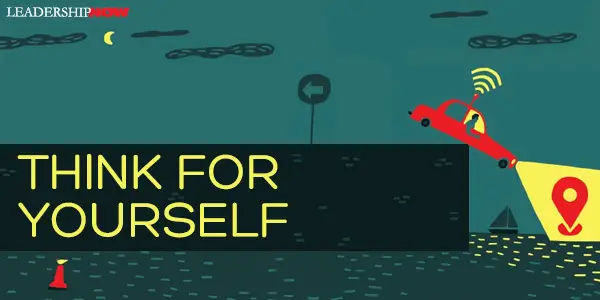
A GREAT IRONY of our time is that even as we are more informed, we are thinking less. We outsource our thinking. We rely on others to think for us. And we do almost unconsciously, by default, without thinking. As the change around us adds complexity and an overwhelming number of choices, we naturally defer to experts to focus our attention on what matters. In Think for Yourself, Harvard University lecturer Vikram Mansharamani cautions that “by outsourcing our focus to them, we willfully let them take control over our field of vision, blind to what they leave out.” He cautions, “At the very least, we should think about, and ideally ask about what other variables might be worth considering.” When we listen to or limit our options to the criteria of a similar set of experts, it will limit our options, filter our information, and the soundness of our decisions. When “our decision frames are set by others, and we forget to keep track of what options and factors we ignore, [we open] ourselves up to unnecessary risks and missed opportunities” and unsubstantiated fear and perspectives. When an expert focuses on their specialization, they often lose the broader perspective that has a significant bearing on the issue in question. “The key is to step back and ask: What are you losing when you narrow your option set?” Focus May Work Against Us While focus has its place, focusing is a process of filtering out and ignoring. When we do, we miss out on some things and see more of what we are focusing on. “Focus increases confidence while clouding judgment.” Fundamentally, the Peter Principle is about focus. It’s about how managers tend to focus too much on how a person is doing in their current job as the means through which to evaluate their potential for their next job. But when you stop to think about it, that doesn’t make a ton of sense. Evaluation criteria should be based on future roles. It may mean that some people who are performing poorly in their current position may blossom if promoted. We’ve heard it said that the cure is worse than the disease. “By focusing intensely in one domain, we often fail to see how our actions may create the very problem we are seeking to avoid. We need to step back, zoom out, and look at the whole system rather than just its parts. The sad reality is that many of our supposed solutions are compounding the problems.” The bottom line is that we are all dependent on others to some extent; it’s a fact of modern life. But this dependence need not translate into blind obedience. As we turn to those who can help, we must remember their limitations and appreciate other perspectives. Triangulate Perspectives We need to take the time to gather other perspectives—to triangulate unique points of view. A perspective is, by definition, incomplete. Each has its limitations. We owe it to ourselves to get several points of view to expand our context. On a personal level, empathizing and seeing your circumstances in a bigger context can be useful. It’s helped dampen my exuberance when I’m on top of the world, and also boosted my spirits during tough times. Having a broader context on your own perspective is critical in uncertain times. In navigating uncertainty, Mansharamani reminds us that “probing, sensing, and responding are key activities. It’s a dot-connecting exercise, not a dot-generating one.” Experts are among the least successful predictors in times of massive uncertainty. They often think they know more than they actually do and therefore exhibit more confidence than is warranted. Hubris tends to affect their objectivity, particularly when they become the go-to thinkers to help others who by definition are admittedly confused. The result: a significant number of very visible expert predictions have gone embarrassingly wrong…. It was often developments outside of their domain that derailed their predictions. Experts are more reliable in complicated environments and where there is a clear cause-and-effect relationship. Mansharamani says we need to “come up with a new way to engage experts.” To begin, we need to “abandon our devotion to depth and reintroduce a greater focus on breadth.” Economist Noreena Hertz said in a 2010 TED Talk: We’ve become addicted to experts. We’ve become addicted to their certainty, their assuredness, their definitiveness, and in the process, we’ve ceded our responsibility, substituting our intellect and our intelligence for their supposed words of wisdom. We’ve surrendered our power, trading off our discomfort with uncertainty for the illusion that they provide. Navigating uncertainty requires that we learn to triangulate unique points of view and connect the dots. “It takes an independent, external, and less-focused perspective to connect the dots in a conclusive way.” Rather than going out and getting a “second first opinion, we need to get “a true, unadulterated, independent second opinion.” We can help ourselves by exposing ourselves to different points of view and experiences and becoming perpetually curious rather than accepting a single perspective. “The idea of being broad enough to contextualize information is critical; it helps to generate awareness that there are those who know more than we do and allow us to place the inputs of experts and specialists in perspective.” The future belongs to those who can think for themselves. 
Posted by Michael McKinney at 01:50 PM
11.19.20

Leading Thoughts for November 19, 2020
IDEAS shared have the power to expand perspectives, change thinking, and move lives. Here are two ideas for the curious mind to engage with: Gary Burnison on anticipating what lies ahead: “You don’t need a crysal ball to anticipate. Rather, you need to be acutely attuned to what’s happening around you and in the world at the present moment. Once you see reality clearly, then—and only then—can you make the leap to extrapolate the meaning. You move from seeing only “this is what is happening now” to the lens “what this means for the future.” In other words, based on what you know now, what are he consequences—both positive and negative?” Source: Leadership U: Accelerating Through the Crisis Curve Ross Ellenhorn on personal accountability: “That’s how life works for most of us most of the time: we authentically take control of our existence only sparingly, and mainly pretend we’re not in control when we actually are. All the theatrics stop, however, when we head twowaard personal change. Source: How We Change (And Ten Reasons Why We Don’t) Look for these ideas every Thursday on the Leading Blog. Find more ideas on the LeadingThoughts index.
Posted by Michael McKinney at 11:39 AM
11.12.20

Leading Thoughts for November 12, 2020
IDEAS shared have the power to expand perspectives, change thinking, and move lives. Here are two ideas for the curious mind to engage with: Margaret Wheatley on dealing with change and developing new capacities: “It is possible to prepare for the future without knowing what it will be. The primary way to prepare for the unknown is to attend to the quality of our relationships, to how well we know and trust one another.” Source: “When Change Is Out of Control” in Human Resources in the 21st Century Brad Stulberg and Steve Magness on the downside of obsessive passion: “Those who are most focused on reaching some external barometer of success are often the same people who struggle most to enjoy it. That’s because they’ll always crave more. More money. More fame. More medals. More followers.” Source: The Passion Paradox Look for these ideas every Thursday on the Leading Blog. Find more ideas on the LeadingThoughts index.
Posted by Michael McKinney at 11:00 AM
11.11.20

The Myth of Experience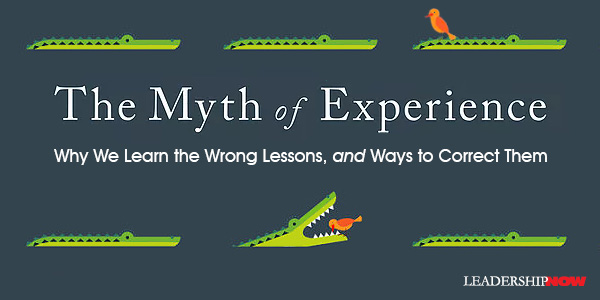
WE LEARN from experience. We’d be silly not to. But the question becomes, what are we learning? Experience is a powerful teacher, and therein lies the problem. We may think we are gaining wisdom, when in fact we are just reinforcing the wrong lesson just as powerfully. In The Myth of Experience, Emre Soyer and Robin Hogarth write that “while experience still leads to learning, there is no guarantee that its lessons accurately represent the reality of a situation.” We naturally assume that what we see is all there is. Experience rarely gives us a complete picture of the situations we face. What we think is reality is just what we can see. And this is true in certain circumstances—in learning environments that are kind. In kind learning environments like cycling and tennis, “decision makers receive abundant, immediate, and accurate feedback on their actions and the rules of the game remain largely constant.” If everything we did was like tennis or cycling, then the lessons we gain from experience would be fairly reliable. But many/most experiences in life are not like that. Much of the time, our circumstances are not that reliable. Our activities fall into the category of wicked learning environments, “where experience is constantly subject to a variety of filters and distortions.” That means what we think we are experiencing does not correspond with reality. These circumstances “may not only fail to represent a given situation accurately but also constantly feed us a convincing illusion. The rules can change suddenly and dramatically, rendering our institutions obsolete.” So, what do we do? Rejecting what we think we know can be very difficult. Two Crucial Questions You Need to Ask Recognizing that what we are experiencing may not be connected to reality is the first step. Next, ask two questions about what you are experiencing: What’s missing? Is there something important missing from my experience that I need to uncover is I hope to fully understand what is happening? And What’s irrelevant? What irrelevant details are present in my experience that I need to ignore to avoid being distracted from what is happening? How We Learn from Experience Our experiences quickly become part of a story we tell ourselves. And these stories become the basis for the judgments and predictions we make. They help us to form cause-and-effect relationships. While these stories can be beneficial to us, they can also be too simple to adequately capture the reality of the situation. And we can see stories where none exist—no cause-and-effect. When we tell this story enough, it can be hard to accept anything else. If not handled with care, our experience can make us believe in the wrong causes, expect unrealistic consequences, evaluate performances inadequately, make bad investments, reward or punish the wrong people, and fail to prepare us for future risks. Worse, we may not even notice that we are acting upon faulty stories and fail to revise them in a timely and appropriate way. As a result, we may end up solving the wrong problems, using inadequate methods, and failing to achieve our objectives. And we need to be careful about learning from the experiences of others. We’ve all seen and read them: The 8 Things Billionaires Do Every Day. What the Most Productive Do Before Breakfast. 10 Common Traits of Effective Leaders. These lists can be helpful in that they get us to think about our habits and give us insight into what’s possible, but how accurate are they. I mean, did all of the people interviewed diligently do everything on the list? Are these things they do the result of their success or the cause of their success. Are they predictive? What about people who did these things and failed?
If we are to learn the right lessons from experience we need to ask ourselves, what’s missing and what’s irrelevant from our situation. And The Myth of Experience illuminates the way. 
Posted by Michael McKinney at 05:43 PM
11.06.20

2020: The Opportunity of a Lifetime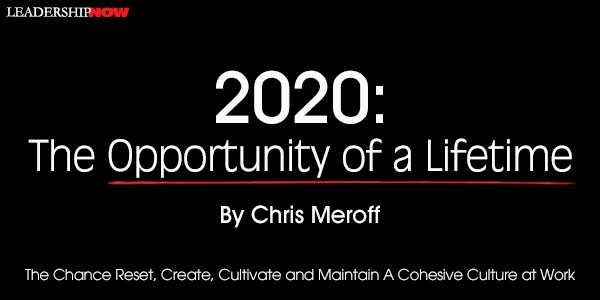
I AM A BIG BELIEVER that growth and transformation happens outside of our comfort zones. And this year has been anything but comfortable. Transformation is coming. This pandemic has wreaked havoc on our country in more ways than one. We are being forced to grow and adapt or fall by the wayside. While I am not advocating that a crisis is something to pursue, I do believe it forces us to grow in ways we would not have otherwise. This will be the greatest opportunity in our lifetimes to start over. A complete reset, to create, cultivate and maintain a cohesive culture at work. It can be a fresh start forced upon us by something out of our control. What has been a tragedy on many levels can be used for good. This can be life changing for so many. In order for transformation to come, we need to face reality for a second. If your company culture was toxic before, I can’t imagine what it will look like when you get back into the office. Dysfunction isn’t static. It’s either being addressed and fixed or it’s growing. Communication, which was likely already at a minimum in the workplace, became even quieter and more distant. If people were cynical and unhappy before, then what will getting back together look like? If they didn’t like their coworkers before, they won’t like them now. If they didn’t like their leadership before, they won’t now. Six months at home with their family, away from the drama around the office, and limited distractions has only reinforced their desire to stay as far away from the office as possible. A cohesive culture is impossible to achieve when your people aren’t at the office. So how do you make your company culture a place people are drawn to and not away from? Great cultures don’t just happen overnight. You can’t just hire your way to a fulfilled workplace of engaged employees and team members. There’s so much more to be done. It has to be strived for, all day every day. Conversations need to happen to establish what the purpose is, both for the company and the employee. We need to talk about where we want to go together and how we want to treat each other on the journey. Once we can agree to those things then we need to realign to them every single day. Everything we do should be done through the lens of purpose. If we can’t connect the task to purpose, then why are we doing it in the first place? A culture with a good purpose will protect itself.We need to affirm the intrinsic value in our people, choose to see the diversity they bring to the table and how we can achieve our goals by unifying together. These conversations won’t be casual breakroom talk or quick hallway catch-ups. They will be authentic and real unity driven conversations that foster community among employees and leaders. It is the role of a leader to get to know their people’s passions and soft skills—what makes them unique. Then learn how to apply those passions and soft skills to help us accomplish our purpose together. If we as leaders do this, we might look back some day and say that the silver lining, in a very difficult year, was the real and lasting change that made the workplace a destination, not just a means to an end.  
Posted by Michael McKinney at 09:38 AM
11.05.20

Leading Thoughts for November 5, 2020
IDEAS shared have the power to expand perspectives, change thinking, and move lives. Here are two ideas for the curious mind to engage with: Neil Postman on information overload: “Information is dangerous when it has no place to go, when there is no theory to which it applies, no pattern in which it fits, when there is no higher purpose that it serves.” Source: Technopoly: The Surrender of Culture to Technology Tod Bolsinger on what is leadership: “Leadership is energizing a community of people toward their own transformation in order to accomplish a shared mission in the face of a changing world. We know we are facing a leadership challenge if it requires us to grow as leaders and as a people, to be transformed int something more than we have been—without losing our core identity—in order to accomplish the mission we have been called to.” Source: Canoeing the Mountains Look for these ideas every Thursday on the Leading Blog. Find more ideas on the LeadingThoughts index.
Posted by Michael McKinney at 07:10 AM
11.02.20

Thoughts on the Presidency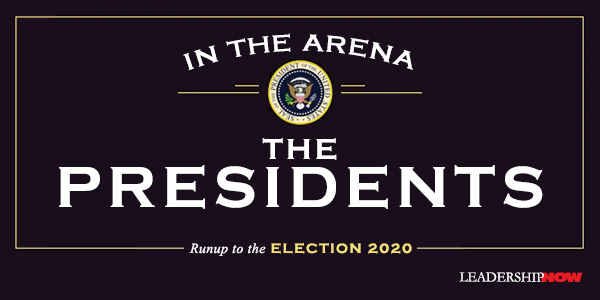
WITH the presidential election of 2020 upon us, here are some thoughts about the presidency: “Despite all of the trappings of power—the big house on Pennsylvania Avenue, Camp David, Air Force One, never having to sit in a traffic jam (ever!)—the president is in charge of an entity over which he has fairly limited power. This is, of course, exactly the way the Founding Fathers wanted it. And yet, try telling that to the American public or to the world when something goes really wrong. As we have seen, large-scale governmental failure becomes presidential failure, whether the president likes it or not.” — Elaine Kamarck, Why Presidents Fail “One can write endlessly about the differences between the first and twenty-first centuries A.D. But then as now, there is no greater attribute for a ruler than humility built on an accurate assessment of his own limits, from which the finest cunning emerges.” — Robert Kaplan, Warrior Politics “In selecting those who might occupy the most important office in this country—the Presidency—we put our potential leaders through a process that is both strange and brutal. The people who might make crucial decisions about war and peace, about our taxes, who will have enormous effect on the quality of our lives, our social order, the civility of our public discourse, undergo an experience from which few human beings could emerge whole. Some do not.” — Elizabeth Drew, The New Yorker, Running, November 23, 1975 “The President is, first of all, a manager.” — Peter Drucker, How to Make the Presidency Manageable, Fortune November 1974 “You can’t just appoint smart people.” You have to have a team and operate as a team, and any corporation would have a training program to acculturate people. — Newt Gingrich, 2011 “Blaming the bureaucracy is an easy way to gloss over the failures of government, yet running a government without the support of the bureaucracy is like running a train without an engine.” — Stephen Hess, Organizing the Presidency “No real-world human being brings to the U.S. presidency the range of attributes necessary for full success in the job”— James Fallows “Elections these days often seem more about who is to blame than who is to govern. New governments end up unpopular rapidly after their ascent to power, and very quickly the debate focuses on who or what is to be voted out rather than who is to be voted in. Voters are less inclined to see their selection as a long-term contract with a candidate or party and more likely to see it as resembling a transaction with a used car salesman.” — Tyler Cowen, The Complacent Class “In a democracy, someone who fails to get elected to office can always console himself with the thought that there was something not quite fair about it.” — Thucydides, History of the Peloponnesian War “The ruling power is always faced with the question, ‘In such and such circumstances, what would you do?’, whereas the opposition is not obliged to take responsibility or make any real decisions.” ― George Orwell
Posted by Michael McKinney at 07:29 AM
11.01.20

First Look: Leadership Books for November 2020Here's a look at some of the best leadership books to be released in November 2020. Don't miss out on other great new and future releases not listed here.
Align, part 1 of a 3-part series, shares four simple steps that transforms the way leaders lead and renew their self-confidence. Through the process Align offers, leaders develop the courage to connect with their team in a meaningful way and start winning together. Through Align, leaders will learn to create alignment within their organization and develop a culture built on employee fulfillment. It shows leaders exactly how to get there.
Creative work doesn't come with a guarantee. But there is a pattern to who succeeds and who doesn't. And engaging in the consistent practice of its pursuit is the best way forward. Based on the breakthrough Akimbo workshop pioneered by legendary author Seth Godin, The Practice will help you get unstuck and find the courage to make and share creative work. Godin insists that writer's block is a myth, that consistency is far more important than authenticity, and that experiencing the imposter syndrome is a sign that you're a well-adjusted human. Most of all, he shows you what it takes to turn your passion from a private distraction to a productive contribution, the one you've been seeking to share all along.
A guide to understanding and overcoming bias in the workplace, from the experts at FranklinCovey. Unconscious bias affects everyone. Ideal for every manager who wants to understand and move past their own preconceived ideas, The Leader’s Guide to Unconscious Bias explains that bias is the result of mental shortcuts, our likes and dislikes, and is a natural part of the human condition. And what we assume about each other and how we interact with one another has vast effects on our organizational success—especially in the workplace. Teaching you how to overcome unconscious bias, this book provides more than thirty unique tools, such as a prep worksheet and a list of ways to reframe your unconscious thoughts.
Civility Rules! offers an opportunity to learn about the history, substance, and significance of civility through the lens of George Washington’s “Rules of Civility.” Drawing on personal experience, real-life examples, and a foundational belief that civility is integral to a democratic society, author Shelby Scarbrough shares how we might work toward a more perfect union by building a personal practice of civility. Civility is not an archaic concept of manners and politeness but rather a crucial component of a functioning democracy. Shelby shows us how―with conscientious practice and patience―we can each contribute to the preservation of our democracy, one interaction at a time.
In Jeff Bezos's own words, the core principles and philosophy that have guided him in creating, building, and leading Amazon and Blue Origin. In this collection of Jeff Bezos's writings—his unique and strikingly original annual shareholder letters, plus numerous speeches and interviews that provide insight into his background, his work, and the evolution of his ideas—you'll gain an insider's view of the why and how of his success. Spanning a range of topics across business and public policy, from innovation and customer obsession to climate change and outer space, this book provides a rare glimpse into how Bezos thinks about the world and where the future might take us.
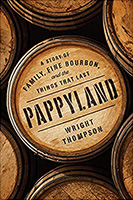 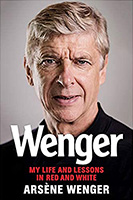 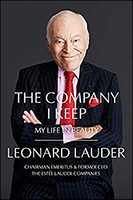
 Build your leadership library with these specials on over 32 titles. All titles are at least 40% off the list price and are available only in limited quantities. “Reading is the nourishment that lets you do interesting work.” — Jennifer Egan
Posted by Michael McKinney at 07:21 AM
|
BUILD YOUR KNOWLEDGE


How to Do Your Start-Up Right STRAIGHT TALK FOR START-UPS 
Grow Your Leadership Skills NEW AND UPCOMING LEADERSHIP BOOKS 
Leadership Minute BITE-SIZE CONCEPTS YOU CAN CHEW ON 
Classic Leadership Books BOOKS TO READ BEFORE YOU LEAD |
|